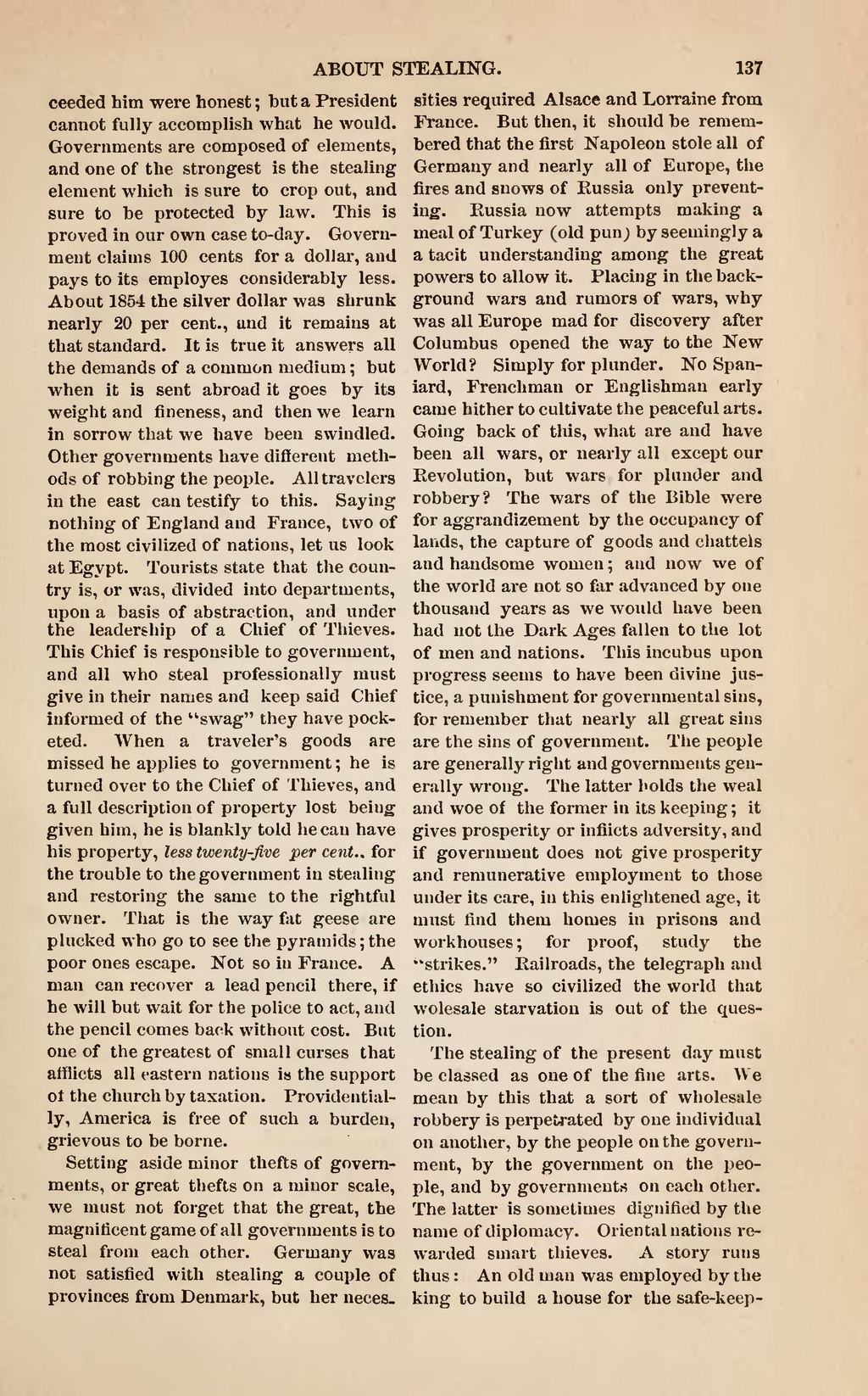ABOUT STEALING.
��137
��ceeded him were honest ; hut a President cannot fully accomplish what he would. Governments are composed of elements, and one of the strongest is the stealing element which is sure to crop out, and sure to be protected by law. This is proved in our own case to-day. Govern- ment claims 100 cents for a dollar, and pays to its employes considerably less. About 1854 the silver dollar was shrunk nearly 20 per cent., und it remains at that standard. It is true it answers all the demands of a common medium ; but when it is sent abroad it goes by its weight and fineness, and then we learn in sorrow that we have been swindled. Other governments have different meth- ods of robbing the people. All travelers in the east can testify to this. Saying nothing of England and France, two of the most civilized of nations, let us look at Egypt. Tourists state that the coun- try is, or was, divided into departments, upon a basis of abstraction, and under the leadership of a Chief of Thieves. This Chief is responsible to government, and all who steal professionally must give in their names and keep said Chief informed of the "swag" they have pock- eted. When a traveler's goods are missed he applies to government ; he is turned over to the Chief of Thieves, and a full description of property lost being given him, he is blankly told he can have his property, less twenty-five per cent., for the trouble to the government in stealing and restoring the same to the rightful owner. That is the way fat geese are plucked who go to see the pyramids; the poor ones escape. Not so in France. A man can recover a lead pencil there, if he will but wait for the police to act, and the pencil comes back without cost. But one of the greatest of small curses that afflicts all eastern nations is the support of the church by taxation. Providential- ly, America is free of such a burden, grievous to be borne.
Setting aside minor thefts of govern- ments, or great thefts on a minor scale, we must not forget that the great, the magnificent game of all governments is to steal from each other. Germany was not satisfied with stealing a couple of provinces from Denmark, but her neces-
��sities required Alsace and Lorraine from France. But then, it should be remem- bered that the first Napoleon stole all of Germany and nearly all of Europe, the fires and snows of Russia only prevent- ing. Russia now attempts making a meal of Turkey (old pun; by seemingly a a tacit understanding among the great powers to allow it. Placing in the back- ground wars and rumors of wars, why was all Europe mad for discovery after Columbus opened the way to the New World? Simply for plunder. No Span- iard, Frenchman or Englishman early came hither to cultivate the peaceful arts. Going back of this, what are and have been all wars, or nearly all except our Revolution, but wars for plunder and robbery? The wars of the Bible were for aggrandizement by the occupancy of lands, the capture of goods and chattels and handsome women ; and now we of the world are not so far advanced by one thousand years as we would have been had not the Dark Ages fallen to the lot of men and nations. This incubus upon progress seems to have been divine jus- tice, a punishment for governmental sins, for remember that nearly all great sins are the sins of government. The people are generally right and governments gen- erally wrong. The latter holds the weal and woe of the former in its keeping ; it gives prosperity or inflicts adversity, and if government does not give prosperity and remunerative employment to those under its care, in this enlightened age, it must find them homes in prisons and workhouses; for proof, study the strikes." Railroads, the telegraph and ethics have so civilized the world that wolesale starvation is out of the ques- tion.
The stealing of the present day must be classed as one of the fine arts. We mean by this that a sort of wholesale robbery is perpetrated by one individual on another, by the people on the govern- ment, by the government on the peo- ple, and by governments on each other. The latter is sometimes dignified by the name of diplomacy. Oriental nations re- warded smart thieves. A story runs thus : An old man was employed by the king to build a house for the safe-keep-
�� �
